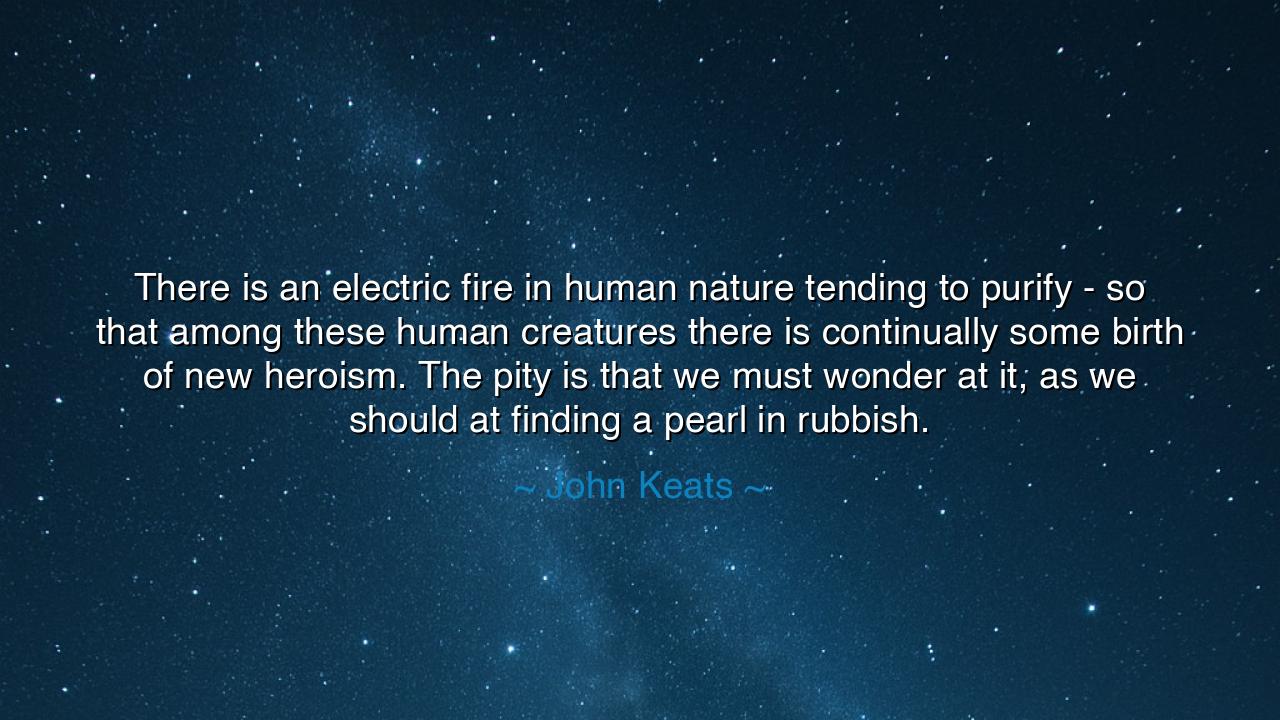
There is an electric fire in human nature tending to purify - so
There is an electric fire in human nature tending to purify - so that among these human creatures there is continually some birth of new heroism. The pity is that we must wonder at it, as we should at finding a pearl in rubbish.






Hear the burning words of John Keats, the poet of beauty and mortality, who declared: “There is an electric fire in human nature tending to purify—so that among these human creatures there is continually some birth of new heroism. The pity is that we must wonder at it, as we should at finding a pearl in rubbish.” These words, like sparks themselves, leap from the page and set the soul alight. In them, Keats reveals a paradox: that within the frailty of humankind lies a force both shocking and divine, an electric fire that bursts forth in moments of courage and sacrifice, yet so rarely and unexpectedly that we marvel at it as if it were unnatural.
The first truth here is the image of the electric fire. Fire has always symbolized both destruction and purification, and electricity—newly studied in Keats’s time—spoke of unseen energy, a force hidden within the world yet capable of illumination and power. To say this fire burns within human nature is to remind us that each soul carries a hidden spark, restless and striving toward nobility. It is not a foreign gift but an inner inheritance, waiting to blaze forth when tested by circumstance.
From this fire comes the continual birth of new heroism. Keats does not speak of heroism as something rare or confined to legends of old, but as something always being born, always rising from the depths of ordinary humanity. Each generation, each trial, calls forth individuals who, in the moment of need, transcend selfishness and reveal the greatness within. Yet, he laments, such heroism astonishes us—when in truth it should be expected, as natural as the sunrise.
History bears witness to this mystery. Consider the firefighters who rushed into the burning towers on September 11, 2001. They were not demigods, not mythical figures—they were ordinary men and women, human creatures of flesh and fear. Yet in the crisis, the electric fire blazed, and their courage became a light for the world. Or think of the countless nameless souls in times of plague who tended the sick when others fled. These are not pearls crafted in luxury, but pearls in rubbish—shining acts of heroism born out of the common dust of humanity.
And yet, Keats grieves that we are surprised by this. Why do we marvel at heroism as if it were alien? Why do we expect selfishness, cruelty, or cowardice as the norm, and treat nobility as a strange exception? This is his sorrow: that we have so lowered our expectations of humanity that when goodness blazes forth, we gaze upon it in wonder, instead of recognizing it as the flowering of our truest nature.
The deeper meaning of his words is both chastisement and hope. He chastises us for being astonished at human greatness, as if it were rare. But he also gives hope, for he affirms that this greatness is always possible, always within reach, always being born anew. The electric fire never dies—it may be hidden, it may be ignored, but it is ever present, ready to purify, ready to lift the human spirit into acts of courage, compassion, and sacrifice.
The lesson, then, is clear: do not treat heroism as an anomaly. Expect it, nurture it, and recognize it in yourself and in others. Believe that within every human soul burns that electric fire. In your daily life, you may not be called to legendary deeds, but you are called to countless small acts of heroism—standing for truth, giving when it costs you, showing love when it would be easier to turn away. Each act feeds the fire, each choice polishes the pearl in the dust.
Remember always: within you burns the electric fire of human nature, tending always to purify. You are not merely a fragment of dust, condemned to mediocrity. You are a bearer of light, capable of birthing new heroism into a weary world. Do not let the world’s cynicism make you marvel at goodness as if it were rare. Let it be your expectation, your daily pursuit, and your offering to those who will one day look back and say: here, in the midst of the ordinary, a pearl was found.






AAdministratorAdministrator
Welcome, honored guests. Please leave a comment, we will respond soon